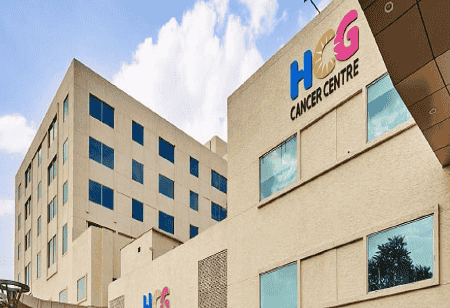India Pharma Outlook Team | Friday, 07 November 2025

In a moment that transcended medical victory, Ujwala Chavan, a 37-year-old from Mumbai, recently sat down to a simple, solid meal; an act most take for granted, but one she had been waiting 14 years to experience.
The struggle had started with a debilitating stricture shortly after marriage and a subsequent cancer diagnosis in September this year. This culminated in a life-restoring robotic esophagectomy at HCG Manavata Cancer Centre (HCGMCC).
A stricture at the junction of her throat and food pipe had made swallowing solid food impossible, requiring Chavan to undergo repeated, painful dilatation procedures, confining her to a liquid and soft diet for close to a decade and a half. Her struggle took a dire turn when a growth in her lower esophagus was diagnosed as cancer.
Also Read: New Dynamics of Drug Distribution, Free Medicine Schemes in India
An esophagectomy is performed to remove all or part of the esophagus through the mouth. The surgeon then reconstructs the digestive tract, typically using part of the stomach to create a new connection from the throat to the stomach.
Under the expertise of Prof Dr Raj Nagarkar and his team, the patient immediately underwent a complex, minimally invasive robotic esophagectomy to remove the tumour. She was shifted to the ward on the first postoperative day, began tube feeding by day two and was discharged comfortably on day four.
By the end of the first postoperative week, her scans showed normal findings, allowing her to start oral feeding. During her follow-up visit, she shared that she had eaten her first solid meal in over 14 years, a deeply emotional milestone for the patient, her husband and the medical team.
“There are victories we measure in survival rates, and then there are those we measure in silent, joyful tears. To see a patient regain something as simple yet profound as the ability to eat is one of the most rewarding moments in medicine. For Chavan, each meal now represents not just nourishment, but a victory over pain, fear and limitation.
Also Read: Advanced Formulation Technologies Streamlining Global Pharma Innovation
Our robotic-assisted approach made it possible to perform a complex surgery with precision and minimal trauma, ensuring a faster and smoother recovery,” says Prof Dr Raj Nagarkar, Chief of Surgical Oncology & Robotic Services and Managing Director - KIMS Manavata Hospitals, HCG Manavata Cancer Centre and Six Sigma, Nashik.
The case highlights the advanced capabilities of robotic surgery, which allows for extreme precision in complex anatomical areas, leading to faster recovery, less pain and better outcomes. With cutting-edge technologies and one of India’s most experienced robotic oncology teams, HCGMCC continues to pioneer new possibilities in cancer treatment, bringing hope and healing to patients across the country.
“This case was a challenge on multiple fronts - a long-standing condition, the emergence of cancer and the critical need to restore the patient’s ability to swallow. The robot provided the precision, but it is her incredible resilience that wrote this success story. This isn't just about removing cancer; it's about returning a fundamental joy of life,” concludes Dr Nagarkar.